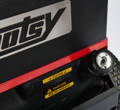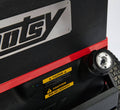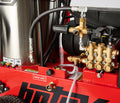How to Budget Pressure Washing Equipment
Published:
03/15/2023

How Much Does a Pressure Washing Business Cost?
Pressure Washing Expenditures (Fixed & Variable Costs)
- Equipment (Pressure Washer or Trailer Rig)
- Accessories (Surface Cleaner, Undercarriage Cleaner, Nozzles, Brushes, Hose, Hose Reel, Trigger Gun, Lance, Foam Cannon or Tank Foamer, Swivel, Recycle System, Tank, etc.)
- Safety Gear (Gloves, Googles, Boots, etc.)
- Chemicals (Detergent)
- Insurance
- Business Permit
- Licenses (Contractor License)
- Marketing (Paid Ads, Website, Flyers, Business Cards, Brochures, Pamphlets, etc.)
- Transportation (Gas, Vehicle, etc.)
Fixed Costs
- Insurance
- Permits
- Marketing
- Compensation
Variable Costs
- Equipment Repairs/Maintenance
- Replacement Parts
- Safety Equipment
- Detergent
- Fuel
Pressure Washing Business: Start-Up Checklist
Equipment
- Pressure Washer: $100 – $5,000
- Vehicle/Trailer: $0 – $35,000
- Fuel: $3.44
- Detergent: $20 - $1,300
Accessories
- Surface Cleaner: $300 - $900
- Undercarriage Cleaner: $200 - $900
- Nozzles and Hoses: $20 - $100
- Water Tank: $100 - $900
- Trigger Gun: $20 - $60
- Lance: $20 - $80
Legalities
- Auto Insurance: $1,427 (average annual cost)
- Licenses: $15 - $200
- Permits
Marketing
- Smartphone and plan: $0 – $500
- Business Software: $0 – $500
- Ads: $0 – $5,000
Pressure Washing Business Start-Up Costs
Pressure Washer
Vehicle
Water Tank
Accessories
How Much to Charge for Pressure Washing
- Driveway – $0.50 per square foot
- Patio or Deck – $0.55 per square foot
- Fencing – $0.45 per square foot
- Roofing – $0.70 per square foot
- Siding – $0.50 per square foot
Price Based on the Project
Houses
- $90 – $275 flat rate for entire home
- $0.75 – $1.25 per linear foot (single story home’s exterior)
- $1.75 – $2.25 per linear foot (two story home’s exterior)
Gutters
- $100: single story
- $135: two floors
- $200: three floors
Boats
- $5 per linear foot: bottom only
- $10 per linear foot: whole boat
Roofs
- $0.20 per square foot
- Double or triple the fee for roofs with steep pitches
Driveways & Sidewalks
- $60 – $150 flat price (depends on size)
- $0.08 – $0.14 per square foot
Fences, Decks, & Siding
- $0.20 – $0.25 per square foot
Mobile Homes
- $50 – $85 flat rate for a mobile home (depends on condition)
- $80 – $100 flat rate for a double wide (depends on condition)
Commercial Cleaning Solutions
- $0.08 -$0.12 cents per square foot for basic surface cleaning
- $75 for standard dumpster and $150 for large
Parking Lots, Garages and Drive Thru
- $0.05 – $0.25 per square foot for parking lots and garage floors (depends on condition)
- $10 – $20 per parking space
Estimate Materials and Overhead Costs
- Vehicle loan: $400 or $3.33 per hour
- Car insurance: $125 or $1.04 per hour
- Cleaning solution supplies: $400 or $3.33 per hour
- Phone and internet: $150 or $1.25 per hour
- Gasoline: $500 per month or $4.17 per hour
- Advertising: $600 or $5.00 an hour
- Equipment maintenance and fuel: $10 per hour
- Office rent: $900 a month, $9 per hour (optional)
Overhead costs are around $40 per hour. Adding in a $60,000 salary that’s $29 per hour. Then if you put money back into the business say $20,000 that’s $9.50 per hour. Now your rate is at $78.50.
If you do additional administrative work that takes around 10 hrs. a week making a 40-hour work week you should earn $3,200 a week. You need to earn $800 more. Divide $800 by the 30 hours you’re working, and you’ll find you need to charge $26.66 more or $106 per hour total.
Feeling ready to start your pressure washer business?
Need equipment, rentals, parts, service, repair, or regular schedule maintenance stop by one of our locations, give us a call or visit our website.
Share this Article ↓






